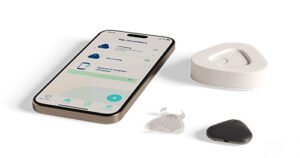
The new device is now wireless and smaller than previous long-term EEG recording versions from the company. It uses AI to detect possible seizures and monitor sleeping patterns.
The company said that “such objective, longitudinal data from everyday life has never been available before”. It added that it “marks a paradigm shift in epilepsy management”.
The EpiSight device also comes with an app so patients can record seizures. Data is stored on a discreet wireless recorder and sent daily directly to the clinician.
The device is implanted just underneath the skin on the scalp, in a procedure which lasts around 20 minutes and using local anaesthetic. It records brain activity 24/7 as patients go about their daily lives. The organisation says this will help to optimise treatment management.
UNEEG medical CEO Torben Sandgren said: “Having access to such objective brain data, medication can be optimised, thus reducing both the seizure burden as well as the harsh side effects of the anti-seizure medication people with severe epilepsy are struggling with.”
Prof Mark Richardson from King’s College London adds: “UNEEG EpiSight is an opportunity for us to address the issue of inaccurate self-reporting – to give us robust outcome measuring in the form of electrographic evidence of a seizure instead of self-reporting.”
The device has CE approval for use for up to 15 months. UNEEG medical is hoping to get CE approval in the autumn for the device to stay in place for up to three years.
The device was presented by UNEEG medical at the International League Against Epilepsy (ILAE) conference in Rome earlier this month.
Speak to your doctor to find out if you could be eligible for a device like this.

